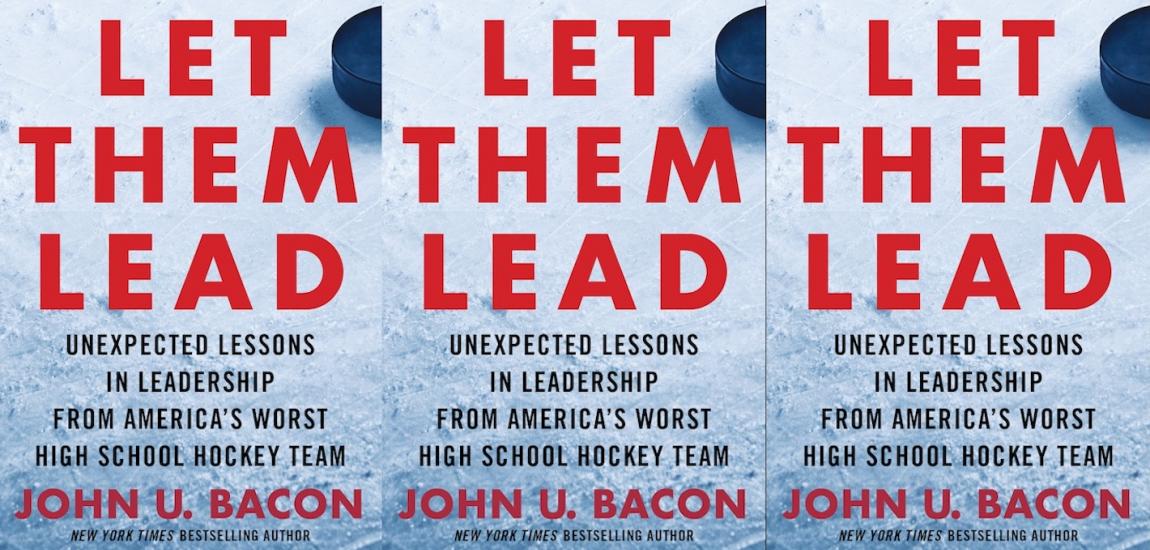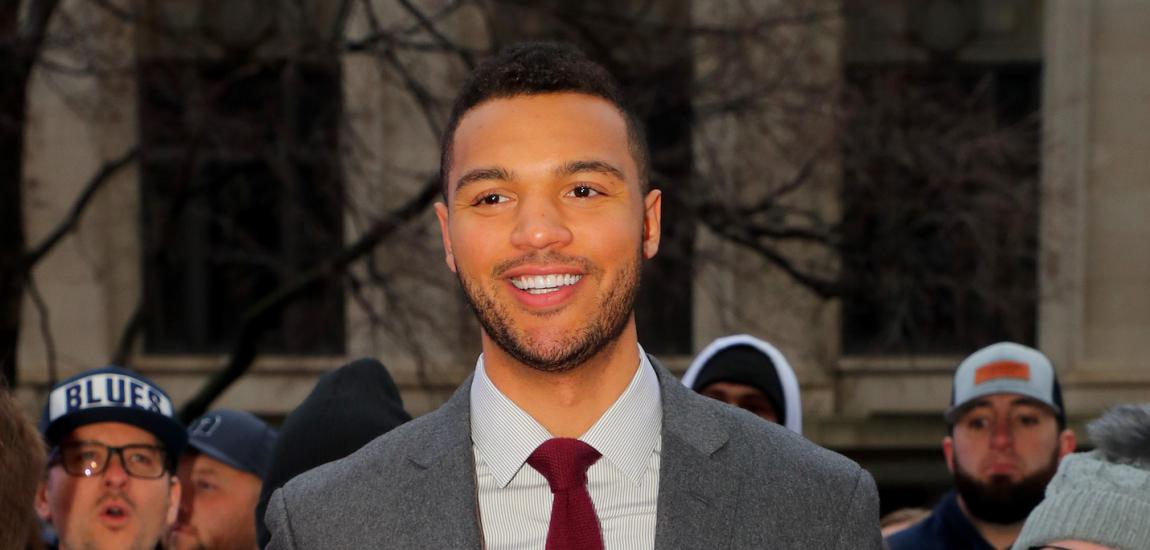Zócalo Square, Mexico City, Mexico.
62 degrees.
Outside.
This was not the setting linesman Tommy George had in mind for his International Ice Hockey Federation debut in January 2011. The Mexican federation built an outdoor rink for the host's opening game of the IIHF World U20 Championships–Division III tournament versus Bulgaria, and it proved to be memorable.
"At one point, a bat died and fell on the ice," George remembers. "There were just crazy things you could never make up that happened during that game. It was a crazy experience. It was kind of neat and foreshadowing of things to come in international hockey."
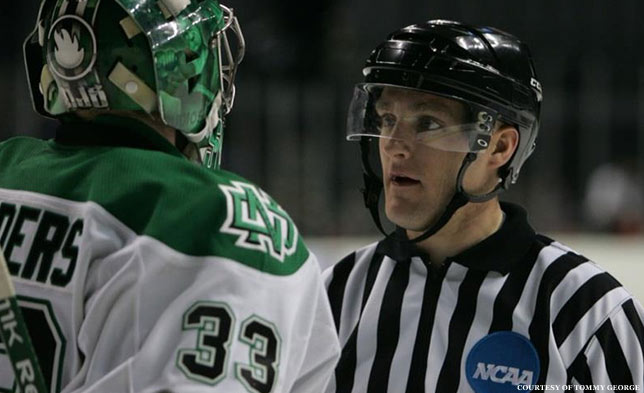
Three years later, George, 29, is gearing up to officiate the ultimate in international hockey: The Olympics. George is one of 14 linesmen selected to work the men's tournament in Sochi, Russia. Of the eight non-NHL linesmen, George is just one of two Americans.
There will be hundreds of thousands of stories written around the world about the unique road athletes have taken to get to Sochi. As an official, Tommy George will not get the glory of an athlete, but his story of working to be the best in the world at what he does is just as compelling.
Consider this: Being a hockey linesman isn't even George's day job. That is working for Special Olympics Maryland. It's his passion for hockey that takes him to college and minor-league rinks around the Northeast on nights and weekends. In pursuing his dream, George says in the past decade he has totaled a car and put "a half million miles on other cars," and spent "a lot of nights in crappy hotels." Crappy hotels? Who knew that kind of off-ice experience would be so practical for Sochi?
Growing up in Frederick, Md., near Washington D.C., George was a goalie and was not half bad. He played Midget AA and AAA in his teens, and along with his father, William, he established a high school team at Urbana High School. After graduation, he moved to Elmira, N.Y., George played junior hockey in Elmira and had a few Division III offers.
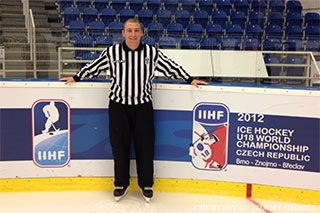
On his off-days, George did not stray from the ice. At age 12, he began officiating youth games through USA Hockey as a way "to spend more time at the rink and make some money."
William and George's mother, Janet, embraced his childhood hobby. They already spent time driving George to the rink to play, so they were not against driving him around to officiate.
"My wife and I had to drive to games and make sure he got there on time," William says. "When he took the assignment, he'd be there. We made sure of that."
In high school, George started taking officiating more seriously and after graduation, he attended a USA Hockey officiating camp. The experience shifted his occupational path.

"It was from that camp I realized I had some goals and some aspirations and thought about pursuing it as a career," George says.
After his junior career, George went to Western New England College in Springfield, Mass., with the original intention to play Division III hockey. He never played a minute, though. George convinced himself his calling was in officiating and shifted his focus.
"I realized my officiating career was going to take me a lot farther than my goaltending career," George says. "It was the writing on the wall for me."
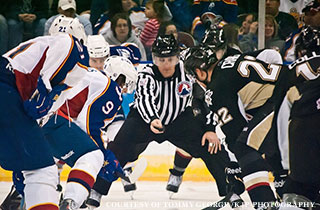
William remembers witnessing the transition during Tommy's college years. It was at this time he knew his son was serious.
"He was still able to stay with the game and do something he loved and be on the ice every day," William says.
At age 19, he accepted a role to officiate in the United Hockey League. By 20, he earned his first job as a linesman in the American Hockey League, the top level of the minors. Since then, he has added the East Coast Hockey League, NCAA Hockey East and the IIHF to his resume, with multiple junior world championships and the 2013 NCAA Frozen Four.
In January, George officiated the Boston College vs. Notre Dame NCAA game at Fenway Park. The temperature of 16 degrees was enough to inspire nostalgia from that first outdoor game in Mexico.
When he got serious about being a linesman, George developed two goals: To officiate in the Olympics and the NHL. He says the Olympic dream started six years ago. At the time, George thought his timeline matched up better for the 2018 Games than the 2014 Games.
George's focus locked into the 2014 Olympics when he was invited to a pre-Olympic camp for officials last August in Magglingen, Switzerland. He was one of 32 officials (17 referees and 15 linesman) at the camp.
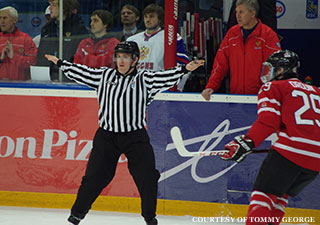
"I got the invitation in June and prepared myself physically and mentally the whole summer," George says. "I wouldn't say the camp was competitive. I think they had a good idea what they were doing. They wanted to see if people came prepared."
Although George was trying out for the apex event in international hockey, he says the tryout made him more confident as a linesman. Despite his relative youth, he was satisfied he could just hold his ground with the best in the world.
"That worst part was waiting from August to December waiting to find out what your fate was," he says.
George got the good news Dec. 1, but in the meantime, he continued to work with his mentor, Dan Schachte, who had worked 30 years as an NHL linesman. Schachte, 55, met George in July 2012 at the USA Hockey National Officials Camp, where both men served as instructors.
Schachte's experience had tons of experience: 2,009 NHL regular-season games, 221 playoff games, five Stanley Cup Finals, a Stanley Cup Game 7 in 2001 and the 2002 Winter Olympics. That combined with George's aspirations established a healthy friendship between the two. When Schachte was hired as coordinator of officials for Hockey East in August 2012, he took George with him.
"I told him it'd be good. I can supervise and help you," Schachte says.
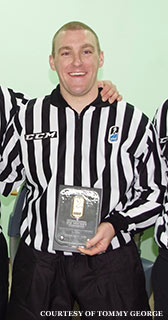
Schachte, who refers to George as "a kid," has done just that. In the time since they have met, Schachte's guidance has turned George into an elite, Olympic-level referee.
"In the last two years, he's taught me more than the last 14 years of being on the ice," George says.
Schachte was not surprised that George received an invitation to the camp nor at his being selected for Sochi.
"I would have been stunned had they not taken him," Schachte says.
George says, "It's starting to sink in as people ask me the last couple weeks. It's a lifetime event for a lot of people. I want to be able to see some things while I'm there and be part of other events. And just take it in and enjoy my time."
William and Janet were in the car when George called to tell them the news. Although the linesman brings a serious demeanor to the ice and his business, he could not help but get mushy on the phone with his parents. Nearly two decades of work was giving the family a reward.
"We were overwhelmed with joy because he mentioned this was his dream," William says. "This was always what he wanted to do when he started refereeing seriously."
It will not all be fun and games for George. While the Olympics are a tourist attraction, they are also a business. The games will not officiate themselves.
"When it's time to get on the ice and get to work, I'll be ready," George says. "Stepping on the ice with the best of the best, it will be an experience to be out there with those players and officials, but you've got to reel yourself in. It's another day at the office."

Back in the states, Schachte will watch George, and his pupil's hockey IQ distinguishes him from his colleagues.
"He's not the biggest guy. He probably won't be their faster guy, probably won't be their strongest, but he's going to be one of the smartest," Schachte says. "He's not a kid that I have to tell things to twice. If I point something out, he'll go out the next period and do it. He always asks questions that are pertinent and relevant. He's the perfect prototype for that type of a job."
Schachte also feels George's goaltending experience helps his skills. As a goalie, Schaete says, "The whole game is right in front of [him]."
For George, the Olympic dream validates devotion to a craft for more than half his life. For five years, his day job has been at Special Olympics Maryland. George started as an intern and now works for as a sports director. While officiating is his passion, the Special Olympics is his main source of income. He thanks his colleagues at Special Olympics Maryland for supporting his officiating career and allowing his trip to Sochi.
He hopes to bring some of his education of "Olympic-style events" back to the Special Olympics.
Perhaps George's strongest trait as a hockey official is understanding his place. While his passion for his job may parallel that of Sidney Crosby or Alexander Ovechkin, he keeps his presence in check.
"We stay out of the spotlight. We're a small piece of the hockey world, but an important piece nonetheless," Georges says. "People don't always realize the goals and aspirations of officials. People don't really understand the commitment of the officiating community, being away from their families to achieve their dreams."
Still under 30, George has a long way to go in his career, which makes his early accomplishments especially impressive.

According to Schachte, an official's prime comes around his mid-40s when he has a body that can still function and an experienced mind. While Schachte remembers the NHL hiring officials in their 20s back in the 1980s, times have changed. But George's appearance in the Olympics will be a hefty accomplishment for a 29-year-old, and it could lead to the next step being the NHL. After all, Schachte does not think there is much more left for George to do other than work in the NHL.
"Obviously I'd like to put my best foot forward here in Sochi and throughout the rest of the American Hockey League and NCAA seasons," George says. "Hopefully, I show them I work hard and you never know what will happen. If it happens, it happens. If it doesn't, it's been a great run so far. I wouldn't trade one experience in my officiating career."
When he takes the ice with the world's best players in the Winter Olympics, George will not be looking for any glory. He will do his best to do his job and do it well. As long as he remains a "small," but important part of the hockey community, he will be doing it right.
George still resides in Frederick, Md., where he plays some hockey at the local rink in the Old Fat Bald Guys Hockey League, but his hockey travels only figure to expand after Sochi.
-- Follow Jeffrey Eisenband on Twitter @JeffEisenband.


